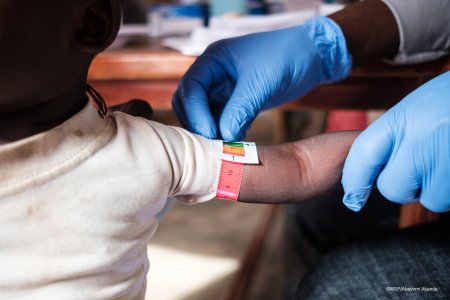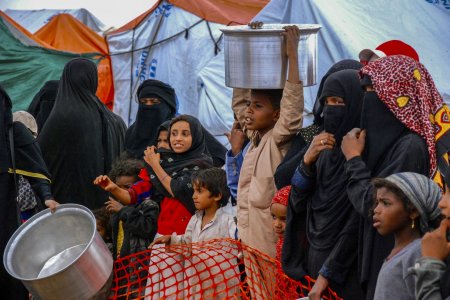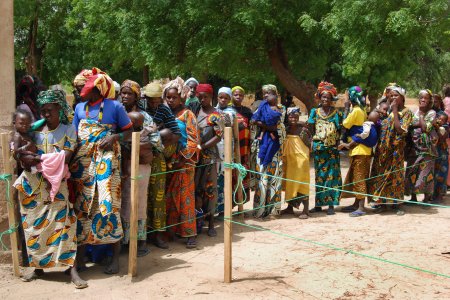
Resale of therapeutic food: who benefits from demonising mothers?
Michel-Olivier Lacharité
This article was published on December 26th, 2022 on the Souk, the MSF associative website.
Accusing the mothers of malnourished children of being lawless fraudsters is a well-worn trope in malnutrition treatment programmes worldwide – and one that has resurfaced recently in Nigeria, stirred up by health workers and the media. These types of accusations obscure a series of tricky truths on the control of resources, the quality of malnutrition treatment programmes, and on the extreme precariousness in which many families live. We see all of this in northwest Nigeria’s Katsina state, where we are currently conducting the largest malnutrition programme in the history of Médecins Sans Frontières/Doctors Without Borders (MSF).
Katsina: the largest number of malnourished children ever treated by MSF
Let's look at the facts. In 2022, MSF admitted more than 107,000 children to our malnutrition treatment program in Katsina state. Launched in 2021, the program is spread across three local government areas: Jibia, Mashi and Katsina city.
What do we know about these 107,000 children? That malnutrition hits the youngest children hardest, with 58% of our patients under the age of two. That most children who needed treatment were at risk of dying, with more than 87,000 of our patients diagnosed with severe acute malnutrition. That a significant part needed intensive around-the-clock care, with more than 13,000 children admitted to one of two inpatient therapeutic feeding centres at MSF-supported hospitals in Katsina.
Managing such a high volume of patients requires a large and highly-skilled medical team, and an extensive outpatient treatment programme with sufficient supplies of ready-to-use therapeutic food – a powdered milk and peanut paste enriched with vitamins and minerals, packaged in a 92-gram sachet, which provides all the nutrients a malnourished child needs to put on weight and return to health.
To recover from malnutrition, one child needs about 100 sachets, consumed over the course of six weeks. Over the past year, we have purchased and distributed more than 10 million sachets of therapeutic food in Katsina state.
The record-breaking number of malnourished children admitted to our centres in Katsina represents a health catastrophe whose contributing factors include poverty, lack of access to food, inadequate medical care and a context of growing insecurity.
"Mothers, those crooks!"
In the midst of this health catastrophe, rumours have been circulating about mothers who starve their children until they are malnourished so as to get their hands on therapeutic food, which they then sell on for personal profit. Last month, health authorities in Katsina state reactivated their ’Taskforce on the misuse of ready-to-use therapeutic food in Katsina state’, and several Nigerian media outlets including HumAngle published stories about the smuggling of therapeutic food and the twisted and shameful actions of women who would not hesitate to sacrifice the health of children for money. See also “How IDPs keep their kids malnourished using citric acid and profit from a nutrition program to heal them” September 6, 2022, Yerwa Express News
What are these accusations based on? Searching the markets of Katsina state does not turn up any large quantities of ready-to-use therapeutic foods for sale. The few trays of sachets found on market stalls are nothing compared to the 61 shipping containers-full of therapeutic food that have been distributed by MSF this year. Any complete cartons found at resale sites are likely the result of diversion by people working in the health system, NGO workers, UN agencies or the Ministry of Health, because mothers have no access to whole cartons, only to individual sachets.
To try to prevent this theft at the source we have a rigorous control policy, whose aim is to verify that all purchased items are delivered to our warehouses and that warehouse outflows correspond to the volume of medical activity recorded.
We also guard against the same child being enrolled in our programme several times through the use of henna, identification bracelets, and measuring the height and weight of children to look for unexpected changes.
Data from our Katsina project suggests that the therapeutic food we distribute is being consumed by those for whom it is intended. Severely malnourished children admitted to the ambulatory programme in Katsina state in 2022 consumed an average of 117 sachets of therapeutic food, gaining an average of 1.53 kg after an average stay of 53 days – figures which correspond to treatment guidelines and are in line with our malnutrition programmes elsewhere.
These rumours of hordes of cynical mothers who sell the therapeutic food meant to treat their children are not based on any observable trends in Katsina. Their only base seems to be the stereotype that the poor and needy, wherever aid exists to help them, are fraudsters who are responsible for their own fate.
Instead of blaming the mothers, ask what they need
It is true that there are some instances of mothers reselling a small number of sachets. We know that two sachets equal the cost of the mother bringing her child to the hospital or health centre and returning home again. These mothers are poor, they may have been displaced from their homes, and they are often forced to travel long distances to bring their child for regular check-ups. However, this is not a widespread practice, and to report otherwise is to distort the facts and fan the flames of prejudice against the poor and vulnerable.
The best way to prevent this practice from happening completely would be to combine nutritional care with the distribution of food and cash. This would mean that mothers in great distress could nurture their malnourished children back to health while providing for the needs of the entire household. Instead of tarring the victims of a nutritional crisis with old-fashioned stereotypes, we must all be better at giving them what they tell us they need.
To cite this content :
Michel-Olivier Lacharité, “Resale of therapeutic food: who benefits from demonising mothers?”, 30 décembre 2022, URL : https://msf-crash.org/en/blog/humanitarian-actors-and-practices/resale-therapeutic-food-who-benefits-demonising-mothers
If you would like to comment on this article, you can find us on social media or contact us here:
Contribute



Add new comment